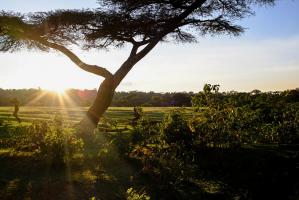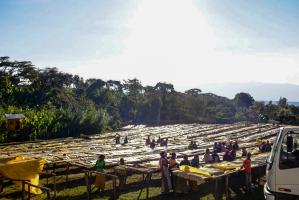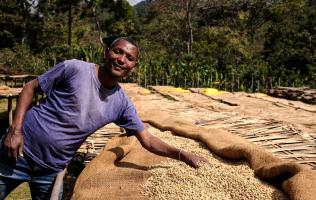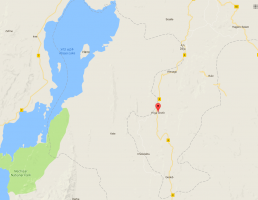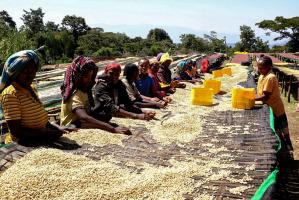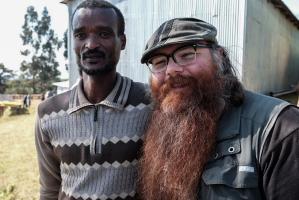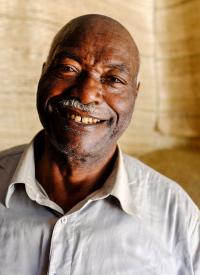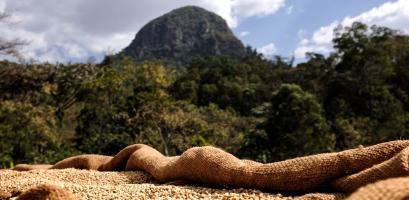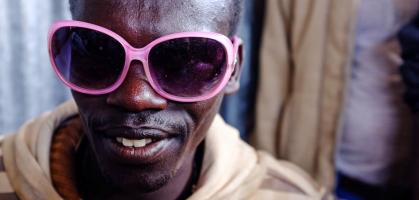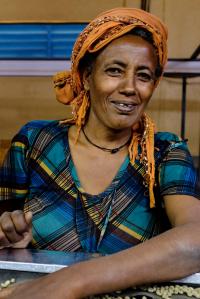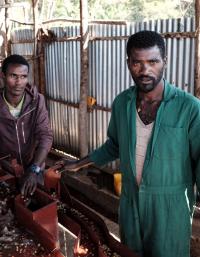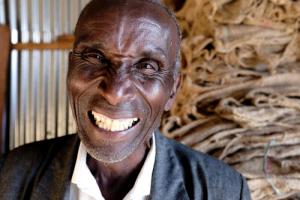We place Ethiopian coffees among the most popular - and you, our lovely customers, do too. This is how we've decided on them for the season and, hopefully, beyond.
During last six months, a selection of extraordinary coffee has been featured in our coffee menu at Nordbeans - whether it was three lots from Kenyan grower John Njorge, Colombian pink bourbon and Tabi varietals or a sensational peaberry lot from Rwanda. One origin, however, was completely missing - Ethiopian coffees!
As usual, it was not just for nothing. We place Ethiopian coffees among the most popular - and you, our lovely customers, do too. So we watched very closely how this year's harvest unfolds. During February's visit to neighbouring Kenya, we heard a lot about the problems that accompanied the harvest, especially in terms of its yields, but also due to the frost that occurred in some areas for the first time since 1950. We remember the political unrest in the Oromia region that led to to destroying up to 50 processing plants and other infrastructure by the end of 2016. On the contrary, we were pleased with the change of the coffee law, which would make it possible for the first time since 2008 to obtain details on the origin of each coffee.
No matter the circumstances, we thought Ethiopia deserves extra attention. Then we decided to focus on one area, explore it thoroughly, pick out the best - and look for something special while on the quest. Our region of choice was Yirgacheffe.
In the coffee world, Yirgacheffe is a well-known term that includes coffee from a specific part of southeast Ethiopia. Administratively, it is a district (woreda) within the Gedeo Zone. Because of the common sensory (flavour and aromatic) „Yirgacheffe“ profile, the term als refers to coffees from nearby districts and towns, such as Kochere (woreda), Gedeb (woreda), Chelelektu, Idido, Dumerso, Konga, Jirimiti among other places. We will not go deeper into complex Ethiopian topography here, but perhaps you have already heard some of these names and they‘re definitely worth mentioning.
Since we were able to trace the coffee to individual processing plants there, we eventually narrowed our search down to Geleana, Abaya and Kochere woredas.All of Ethiopian coffees, which you can look forward to in the coming months, have been dealt by two coffee washing stations - Pride Mill and Reko Koba.
Pride Mill is a completely new washing station, located in the village of Semolo in Geleana woreda. This is a very ambitious project - in the season, the plant employs up to 200 employees, and in the first year of activity it was buying ripe cherries from up to 2200 farmers. The operation is in the hands of an experienced agronomist, Ato Zodi, who, together with his team (Assistant Desale, engineer Teriki, accountant Tesfay), supply the new plant with the necessary experience. The results of their first year of operation were immediately exciting - the coffee is incredibly lively, full of flavor and aroma. We also love to hear the plans for the next years, modification of separation tanks, completion of African beds for drying and further education of all employees.
The Reko Koba processing plant was built at the foot of a mountain of the same name that dominates the surrounding area and you can see it in the gallery (by the way, if you've ever heard of Rocko Mountain coffee, it goes by the name of the same hill - Amharic and other local languages are not used in written form vowels). Under the leadership of manager Eyas Bekele, around 100 employees work in the heart of the Kochere area. In addition to progressive methods of sorting cherry quality, they are also experimenting with the methods of processing - and this is why Nordbeans have a chnace to work with a full rarity - honey processed coffee from Ethiopia!
Michael McIntyre, American Q Grader from Kansas (by the way, not many "third wave" coffee figures really come from Kansas) wash helping to introduce experiments and processing twaks at both washing stations. He spends a lot of time in Ethiopia and shapes the early stage of this long-term project. We at Nordbeans are equally aware of it - we'd love to come back to these coffees. If everything goes well, we could also visit the area next year.
We’re sure will get back to this topic. Hold on with us and don’t forget to try both of the wonderful coffees in the meantime :-)
The picutres are courtesy of Catalyst Coffee Consulting.

